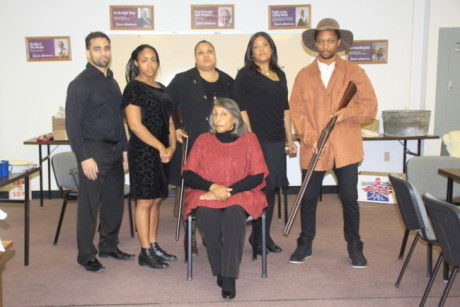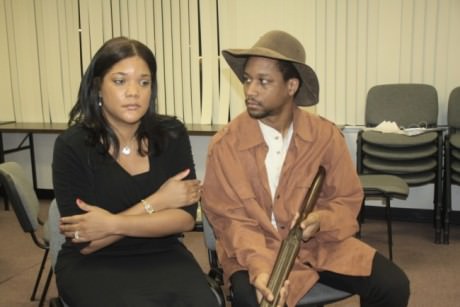An exceptional and powerful production of Pearl Cleage‘s Flyin’ West, is being presented by Bowie Community Theatre. Director Estelle Miller receives top-notch performances from each of her cast members, and she has molded them into an excellent ensemble.

Playwright Pearl Cleage’s body of work for the stage provides us with a remarkable and focused look at the African-American experience over the last 100 years. Her major full-length plays and one-acts include Flyin’ West, Blues for an Alabama Sky, Bourbon at the Border, Chain, and Late Bus to Mecca.
Flyin’ West, a melodrama filled with ideas about race and gender relationships, highlights the achievements of Black homesteaders in Nicodemus, Kansas. Set in 1898, the play includes a cast of six characters. We are in the period just after the abolition of slavery. Taking advantage of the Homestead Act, Black Americans fled the south to vacant lands provided by the Federal Government. After five years, homesteaders earned the right to file for the deed if they could demonstrate that improvements had been made. Not everyone succeeded, or even persevered, although Blacks succeeded in greater percentages than the White claimants. Those who did were often offered cash to give up their now more valuable plots of land, often by white speculators. This migration became known as ‘The Black Exodus.’
Based on journal entries Cleage had collected and read, Flyin’ West is a historical tribute to the Black women who moved West and attempted to find a place for themselves, a place where women could live a decent life.
The play opens on a light note in 1898 with Sophie (Kecia Campbell), a 36 year-old woman, and Miss Leah (Sandra Cox True), a 73 year-old neighbor. Both women are former slaves who are discussing life in the all-Black town of Nicodemus. Cleage’s protagonist women have all earned their deeds. They want to purchase even more land and develop an ‘All-Black Town.’
As the play continues, Sophie, Leah, and Fannie (Lolita Marie) are waiting for Fannie’s sister Minnie (Brawnlyn Blueitt), to arrive from London with her husband Frank (Ben Harris).
Frank is the son of a slave and a plantation owner and is expecting a large inheritance after the death of his father. He claims to be a poet but his main avocation appears to be gambling and profligate spending. Frank is a well-dressed but persistently abrasive character, broadcasting a sense of superiority based primarily on his being a “mulatto,” and being able, he thinks, to pass for white. In reality he is a self-loathing Black man.
He has had to return to the US, and blames Minnie, who wanted to visit her “sisters,” although the impetus actually comes from his father’s recent death and his own wastrel ways. He berates her and her dark skin for contributing to his resumption of the mantle of “Negro,” which he believed he had escaped. The sisters may call the town a paradise for colored people, but Frank refers to it as “Niggerdemus.”
And his verbal and physical abuse is equally hard to listen to and to watch.
“If you were a couple of shades lighter we could travel all over Europe first class.” Minnie, while dressed in the latest London fashion, sports a black eye. No one believes her when she claims it was an accident. And I wanted to grab him and smack him. Harris’ multi-layered performance is a roller-coaster of emotions and it’s a tour-de-force.
Frank is a contrast to Wil who is industrious, calm, and willing to clear the table Wil has even lived with the Indians, a topic not really explored. When challenged by Frank for neglecting to assert masculine privileges, he asserts that “the work goes quicker when we all help.”

Wil Parish is the polar opposite of the narcissistic Frank. He plays Wil Parish with abundant dignity. Wil gives the audience hope for cooperation between the sexes on the frontier, and McCall plays Wil with sincerity and heart.
Miss Leah is played by veteran actress Sandra Cox True with eloquence as she is the spokeswoman for the generation of former slaves whose children were taken from them. They mourn the lost generation, whose ties with their families were never allowed to develop, and whose whereabouts are unknown.
Brawnlyn Blueitt is a theatre newcomer and she delivers a convincing performance as Minnie Dove, the abused spouse who has gone from the US to England and back to the frontier with her values and loyalties intact. I hope she continues to appear in more stage productions.
Lolita Marie plays Fannie Dove, with fierce resolve as she is forced by circumstances to defend her home from an enemy within.
Kecia Campbell’s Sophie Washington, teased for her minimal chances of attracting a man, emerges as a woman with conviction and a mission to pull the community together to create a cohesive community where “a Colored woman could be free to live her life like a human being,” whatever it takes. Campbell’a performance, like Harris’, is a roller coaster of emotions and she commands the stage as she develops her leadership skills.
Dan Lavanga’s set evokes both the cozy domesticity of the homestead and the rustic outdoor setting. It’s a set which is interesting even when it’s shown in silhouette, lit by Lighting Designer Garrett Hyde.
Each sister is given a different hairdo that matches her unique personality. Costume Designers Jeanno Binney and Gayle Negri dress the Londoners in fancy clothing while the locals wear everyday simple dresses.
This is a very long play that, at times, had very slow pacing, (some of it due to set changes) but the cast and the audience, on the day I attended, were both equal to the task.
Flyin’ West is an important play by an influential African American playwright and historical scholar. Bowie Community Theatre’s Flyin’ West is a compelling, educational, poignant, and, at times, amusing production. This powerful production and exceptional performances deserve to be seen and experienced.
Flyin’ West plays through April 25, 2015 at The Bowie Playhouse – 16500 White Marsh Park Drive, in Bowie, MD. For tickets, call (301) 805-0219, or purchase them online, or at the door.
LINKS
Meet the Cast and Director of ‘Flyin’ West’ at Bowie Community Theatre: Part 1: Drector Estelle Miller.
Meet the Cast and Director of ‘Flyin’ West’ at Bowie Community Theatre: Part 2: Kecia A. Campbell.
Meet the Cast of ‘Flyin’ West’ at Bowie Community Theatre: Part 3: Sandra Cox True.
Meet the Cast of ‘Flyin’ West’ at Bowie Community Theatre: Part 4: Darius McCall.
Meet the Cast of ‘Flyin’ West’ at Bowie Community Theatre: Part 5: Brawnlyn Blueitt.
Meet the Cast of ‘Flyin’ West’ at Bowie Community Theatre: Part 6: Ben Harris.
Meet the Cast of ‘Flyin’ West’ at Bowie Community Theatre: Part 7: Lolita Marie.
.





